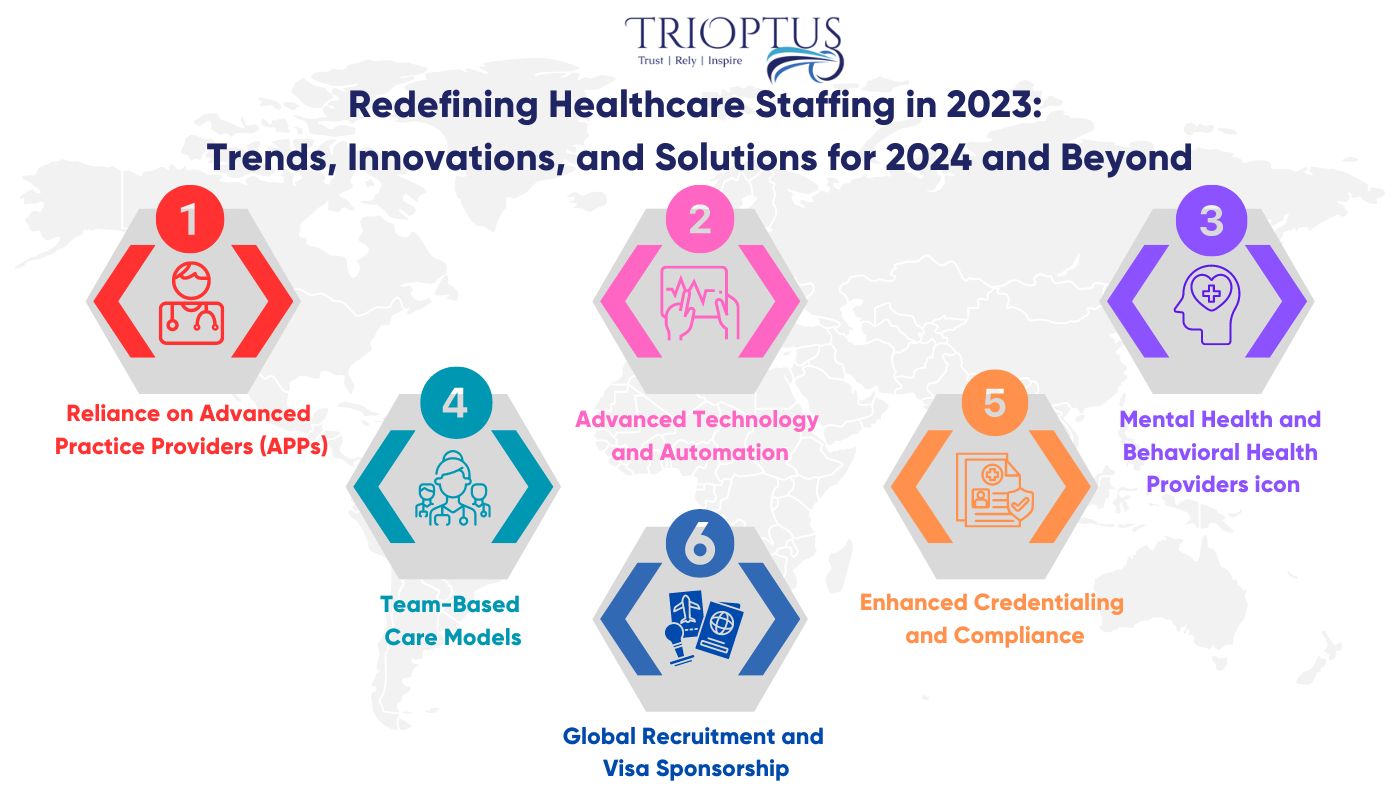Healthcare Staffing Trends from 2023

In 2023, there were important changes in how healthcare staff, like doctors and nurses, were hired and managed. Here are some key things that happened:
Shortages in Important Medical Jobs:
Some medical jobs, like primary care doctors, specialists, and nurses, are needed more than ever. This means there might not be enough of these professionals, and we need creative ways to find solutions.
With an aging population, many Physicians are retiring, making it harder to find enough Physicians, especially in the Midwest and Southern regions of the United States.
Some areas with fewer services for people are paying higher salaries to attract medical professionals.
Certain specialties of doctors, like Family Physicians, used to be in high demand, but that changed after 2020.
Reliance on Advanced Practice Providers (APPs):
Nurse practitioners (NPs) and physician assistants (PAs) are being used more to help with the shortage of doctors. They are becoming more important members of healthcare teams.
There are a lot of nurse practitioners in the U.S., and their role is expanding. Nurse practitioner was even named the top healthcare job in 2023.
The number of physician assistants is also growing, and there are more women entering this workforce.
Telehealth Integration:
Telehealth, or talking to doctors online, is becoming a big part of healthcare. This means we need more professionals who can work with technology to provide care over the internet.
Advanced Technology and Automation:
Healthcare is using more advanced technology like artificial intelligence and robots. This means we need people who understand these technologies or learn these technologies besides the regular human biome.
Mental Health and Behavioral Health Providers:
More focus is being put on mental health, so there is a higher demand for psychiatrists, psychologists, social workers, behavioral/mental health coordinators and counselors.
Indeed Prevention is Better Than Cure:
Healthcare is shifting focus on preventing health issues and managing the health of entire populations. This means we need more professionals like health educators, wellness coaches, and public health experts.
Team-Based Care Models:
Healthcare is moving towards team-based care, where different professionals work together. This includes care coordinators, case managers, and medical assistants.
Healthcare Staffing Agencies and Vendor Management Systems (VMS):
Hospitals and clinics are using agencies and systems to help them hire and manage temporary staff more efficiently which in turn helps them manage the variations in census.
Enhanced Credentialing and Compliance:
There are stricter rules to make sure healthcare professionals are qualified and follow all the regulations. Organizations are investing in tools and people to manage this process better.
Global Recruitment and Visa Sponsorship:
In places where there aren't enough healthcare professionals, organizations are looking outside the US for talent. They are even helping professionals from other countries to come and work.
Work-Life Balance and Well-being:
Healthcare organizations are realizing how important it is for their staff to have a good balance between work and personal life. They are introducing things like flexible schedules and mental health support.
Continuing Education and Training:
Because medicine, technology and processes are always advancing, healthcare organizations are investing in the ongoing training of their staff to keep them up-to-date. There are annual mandated continuous trainings for HIPAA, OSHA, Emergency Preparedness and many other modules that are extremely dynamic post COVID era.
Lingering COVID impacts:
Due to COVID-19, many healthcare professionals faced challenges, but by 2022, things were improving. Some HPs had lower income and had to work with fewer staff, but the situation got better in 2023.
Conclusion:
By keeping up with these trends in healthcare staffing, organizations can adapt to changes, find solutions to the shortage of professionals, and provide high-quality care to patients.
How Can TriOptus Health Help:
TriOptus Health, a leading healthcare staffing solution provider, can assist healthcare organizations in navigating these trends. By offering innovative staffing solutions, including the placement of advanced practitioners, facilitating telehealth integration, and providing access to a global pool of healthcare professionals, TriOptus can help healthcare organizations build a resilient and well-equipped workforce. TriOptus is committed to supporting healthcare organizations in meeting the evolving demands of the industry, ensuring the well-being of both professionals and patients while keeping up with state and federal compliances.